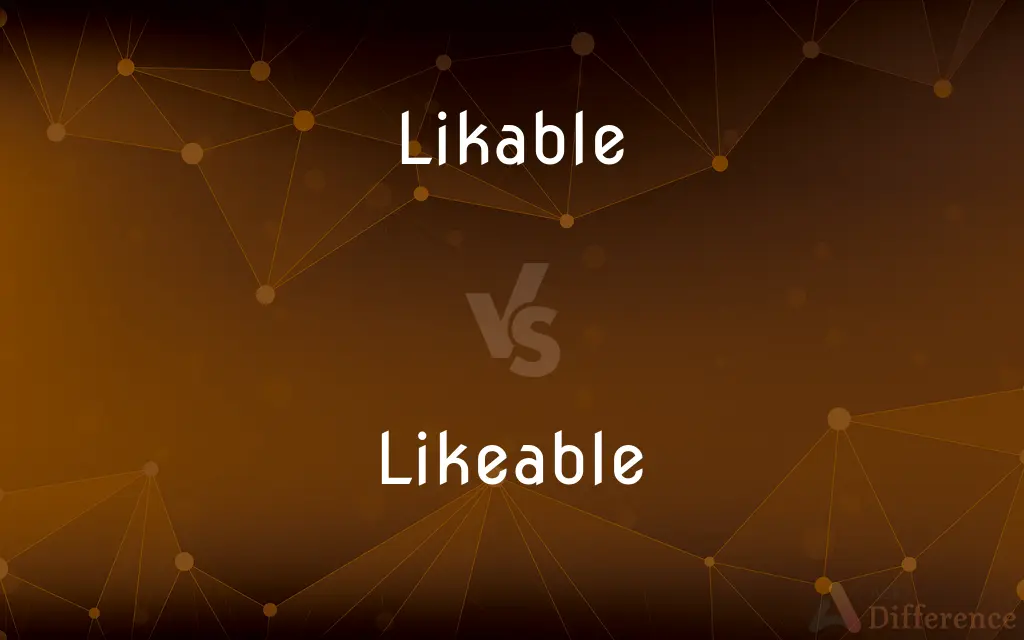Likable vs. Likeable — What's the Difference?
By Urooj Arif & Maham Liaqat — Updated on March 17, 2024
Likable and likeable are variants of the same word, with "likable" being more common in American English.

Difference Between Likable and Likeable
Table of Contents
ADVERTISEMENT
Key Differences
Likable and likeable both describe the quality of being pleasing or easy to like. The difference primarily lies in regional spelling preferences, with "likable" being favored in American English, whereas "likeable" is more commonly used in British English. This variation does not affect the meaning or usage of the word in sentences.
In terms of usage, both spellings are accepted in general writing and convey the same characteristics of a person, place, or thing that is pleasant, enjoyable, or easy to like. For example, a person with a friendly demeanor and positive attitude would be described as either likable or likeable, depending on the regional spelling preference.
The choice between likable and likeable may also reflect the writer's or publication's style guide. Some style guides, particularly those used by American publications, specifically recommend using "likable." On the other hand, publications outside the United States might prefer "likeable."
Despite the spelling differences, there is no distinction in how likable and likeable are used in sentences or understood in context. They both refer to the quality that makes someone or something pleasant and easy to like.
The prevalence of "likable" over "likeable" in American English can be attributed to spelling simplification trends in American English. However, both forms are correct and understood in English-speaking countries, making the choice largely a matter of personal or regional preference.
ADVERTISEMENT
Comparison Chart
Definition
Pleasant, enjoyable, easy to like
Pleasant, enjoyable, easy to like
Spelling Preference
American English
British English
Usage
Used in general and formal writing in the US
Used in general and formal writing, particularly outside the US
Example Sentence
She has a likable personality.
He is a likeable character in the novel.
Variance
None, aside from regional spelling preferences
None, aside from regional spelling preferences
Compare with Definitions
Likable
Pleasant or agreeable; easy to like.
Her likable nature makes her popular among peers.
Likeable
Pleasant or agreeable; easy to like.
His likeable smile won him many friends.
Likable
Used universally in various contexts.
The film features a likable protagonist.
Likeable
Common in both spoken and written British English.
She is a likeable leader with strong empathy.
Likable
Recommended by many American style guides.
The style guide advises using likable for consistency.
Likeable
British English preference.
British authors tend to use likeable.
Likable
American English preference.
American publications often use likable.
Likeable
Used universally in various contexts.
The book's likeable characters enhance its appeal.
Likable
Common in both spoken and written American English.
He is known for his likable demeanor.
Likeable
May be recommended outside the United States.
Our editorial guide prefers likeable for its articles.
Likable
Pleasing; attractive.
Likeable
(especially of a person) pleasant, friendly, and easy to like
A very likeable young woman
Likable
(American spelling) Capable of being liked.
I suppose he's likable; why shouldn't he be?
Likeable
Variant of likable.
Likable
(of a person) Having qualities tending to result in being liked; friendly, personable.
She's a naturally likable person, with lots of friends.
Likeable
(British spelling) likable
Likable
Such as can be liked; such as to attract liking; easy to like; evoking sympathy; as, a likable person.
Likeable
See Likable.
Likable
Disposed to please.
Likeable
(of characters in literature or drama) evoking empathic or sympathetic feelings;
The sympathetic characters in the play
Likable
(of characters in literature or drama) evoking empathic or sympathetic feelings;
The sympathetic characters in the play
Likeable
Easy to like; agreeable;
An attractive and likable young man
Likable
Easy to like; agreeable;
An attractive and likable young man
Common Curiosities
What is the difference between likable and likeable?
There is no difference in meaning; the difference is in spelling preference, with "likable" preferred in American English and "likeable" in British English.
Is one spelling more correct than the other?
No, both spellings are correct and accepted, depending on regional language norms.
How do I know which spelling to use?
Your choice may depend on your audience, the regional version of English you are using, or specific guidelines you are following.
Can I use both likable and likeable in one document?
It's best to choose one spelling and use it consistently throughout a document to maintain style consistency.
Why are there two spellings for the same word?
The variation in spelling reflects differences in American and British English, a common occurrence with many English words.
Will using one spelling over the other affect my writing's understanding?
No, both spellings are widely understood and accepted, and the context of "likable" or "likeable" makes its meaning clear regardless of spelling.
Do dictionaries list both spellings?
Yes, most modern dictionaries list both spellings, often noting the regional preference for each.
Are there other words with similar American and British spelling variations?
Yes, there are many examples, such as "color" (American English) vs. "colour" (British English), reflecting the broader differences between the two variants of English.
Has the preference for one spelling over the other changed over time?
Spelling preferences can evolve, but as of now, "likable" remains preferred in American English, while "likeable" is more common in British English contexts.
Is there a trend towards one spelling in global English?
Global English tends to be more inclusive of regional variations, so both spellings are accepted, though "likable" may be more common in international contexts due to the influence of American English.
Share Your Discovery

Previous Comparison
Obround vs. Oblong
Next Comparison
Defendant vs. PlaintiffAuthor Spotlight
Written by
Urooj ArifUrooj is a skilled content writer at Ask Difference, known for her exceptional ability to simplify complex topics into engaging and informative content. With a passion for research and a flair for clear, concise writing, she consistently delivers articles that resonate with our diverse audience.
Co-written by
Maham Liaqat














































